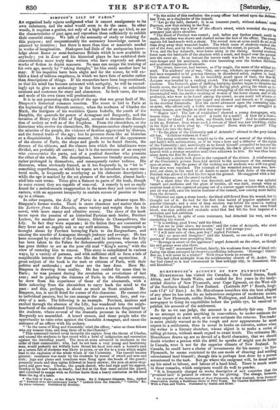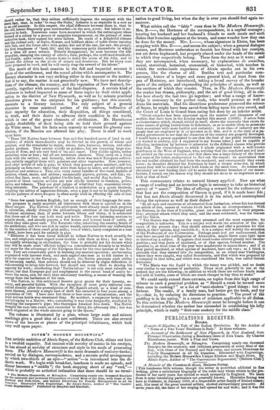HURSTHOUSE'S ACCOUNT OF NEW PLYMOUTH. * Ma. IIURSTHOUSE has visited the
Canadas, the United States, South Africa, and New South Wales, and resided for five years in the lately- settled district of New Plymouth, near Cape Egmont, on the West side of the Northern Island of New Zealand. (Latitude 39° 1' South, longi- tude 174° 15' East.) As Mr. Ilurstbouse considers this the beat adapted of any place he has seen for an industrious emigrant of moderate means, and as New Plymouth, unlike Nelson, Wellington, and Auckland, has no newspaper to bring its capabilities before the public eye, he resolved to publish his account of the settlement. So far as we can judge, the account is a perfectly fair one. There is no attempt to paint anything in rose-colour, to under-estimate the money required to start with, or to over-estimate the returns. The reader is more plainly warned as to the rough and new appearances he must expect in a settlement, than is usual in books on colonies, unless when the writer is a literary sketcher, whose object is to make a series of telling pictures, without much regard to exact truth. The estimates Mr. Hursthouse draws up are so devoid of a florid character, that we should doubt whether a person with the 4001. he speaks of might not do better in Canada, were it not for the superior climate of New Zealand. 111 Canada, he could have a choice of investments for his money : in New Plymouth, he seems restricted to the one mode of clearing and settling unreclaimed land himself; though this is perhaps best done by a person accustomed to the task. But go where the emigrant will, he must make up his mind to labour, and labour of a hard kind. There is much sense in these remarks, which emigrants would do well to ponder. " It is frequently charged on works descriptive of new countries that the 'promised land' is painted in colours far too glowing. The charge, however, • An Account of the Settlement of New Plymouth, In New Zealand, from personal. Observation daring a Residence there of Five Years. By Charles Hursthouse ardor. With a Plan and Views. Published by Smith and Eider. should rather be, that they seldom sufficiently impress the emigrant with the sterii fact, that, in order to reap the fruits, industry is as requisite in a new as in 'mold count/ci,In this respect, the chief difference between them is, that in the old, labour frequently goes unrewarded—in the new, never; but labour is ne- cessary in both. .rumerous cases have occurred in which the extravagant ideas formed of a colony by a person of sanguine temperament, on the perusal of some seductive book, have caused his utter failure. He reads of a delightful climate and the richest soil; of fruits, flowers, and brilliant skies; of noble rivers teeming with fish, and the forest alive with game; but not of the axe, the saw, the plough, the first roughness of bush life,' and the numerous petty discomforts to which for a time all must submit. Bitterly disappointed, he soon becomes the idle grumbler, damping the energy of others ; then, perhaps, the confirmed drunkard; and finally, quite ruined, returns home to damn the scene of his folly, and to picture the colony as the abode of misery and desolation. But let every man come prepared to work, and he will surely reap the reward of his labour."
The merit of this book consists in the full and impartial account it gives of the settlement, and the sound advice which accompanies it. The literary character is not very striking either in the manner or the matter ; that is to say, the matter is not generically new. We have met descrip- tions of the climate, the country, and the vegetation of New Zealand, fre- quently, together with accounts of the land-disputes. A certain kind of freshness is indeed imparted to some of these topics by their strict appli- cation to the district of New Plymouth, . as well as by minute practical directions given to the emigrant for his guidance ; but this scarcely
amounts to a literary interest. The only subject of a general character is some scattered notices of the natives, indicative of their capacity for education, their disposition, all things considered, to work, and their desire to advance their condition in the world, which is one of the great elements of civilization. Mr. Hursthouse speaks doubtfully of their being able to hold their ground against the White men ; but his facts seem scarcely to warrant his gloomy con- clusion, if the Maories are allowed fair play. There is stuff to work upon here.
"These 700 Natives have between four and five hundred acres of land in cul- tivation; of which three-fourths may be devoted to the growth of wheat and potatoes, and the remainder to maize, onions, taro, kumeras, melons, and other garden produce. They subsist chiefly on potatoes, but are becoming large con- sumers of flour, and are very fond of tea and sugar. They dislike spirits, rather preferring wine or beer; but all are inveterate smokers. They carry on a brisk trade with the settlers, and formerly, before there was much European cultiva- tion, entirely supplied them with potatoes and other vegetables. Now, however, their chief article of sale is pigs; of which they possess great numbers, self-fed, principally on fern-root; these they drive from house to house, and sell with great judgment and acuteness. They also carry round bundles of fire-wood, baskets of potatoes, wheat, maize, and melons ; occasionally pigeons, parrots, and fish; ex- cellent flax lines, mats, well-plaited kie-kie hats, and useful flax baskets. The proceeds of these various articles are now chiefly invested in blankets, prints, calico, and tobacco. They are good judges of what they buy, examining every- thing minutely. The purchase of a blanket is undertaken as a grave business, requiring the advice of sagacious friends; even a pipe is not to be lightly bought, and the patience of store-keepers is often sorely tried in effecting the sale of one.
"Some few speak broken English; but as enough of their language for com- mon purposes is easily acquired, all intercourse with them is carried on in the Mann tongue. The Natives of this settlement have already made such progress in education, chiefly through the philanthropic exertions of the Episcopal and Wesleyan ministers, that, of males between fifteen and thirty, it is estimated that three out of four can both read and write. They are becoming anxious to acquire stock, and already possess a few horses and several head of cattle, of which they take great care. The Taranaki tribe, inhabiting the country South of the settlement, and who are rich in native wealth, contracted with our millwrights for the erection of three small grist-mills ; two of which, lately completed at a cost of 8001., have been paid for entirely in pigs. " Hitherto it has been found difficult to induce Natives to work steadily for hire, and employers must expect some trouble with them at first ; but as they are rapidly advancing in civilisation, the time is probably not far distant when they will be made most efficient helps,'—a consummation devoutly to be wished, not more for the advantage of the European than for the true interest of the Na- tive. They are remarkably quick in learning any manual operation; are becoming acquainted with harvest work, and such capital axe-men as to fell timber in a style far superior to the European. In short, the Native possesses such ability fir becoming useful, that settlers should not be deterred by slight difficulties in endeavouring to bring him forward, but should use every effort to develop his capacity for work; recollecting that ' Native labour' is not only most valuable as labour, but that European pay and employment is the surest bond of amity be- tween the races, and, far more than missionary teaching, a means of weaning the savage from the barbarism of his race.
The Natives in this settlement deserve great praise for their honesty, so- briety, and peaceful habits. With the exception of some petty robberies com- mitted directly after the promulgation of Mr. Spain's award, as a kind of com- ment thereon, scarcely a single case of theft has occurred in four years among a Population of 700. I have seen but three or four cases of intoxication; and the most serious battle was occasioned thus. By accident, a carpenter broke a ram- rod belonging to a Native; who, considering it was done designedly, retaliated by breaking the carpenter's pipe; who thereupon knocked him down. The Native brought the case into court, and succeeded in fining his adversary 30s.; but was much disgusted at the whole amount going to the Queen."
The volume is illustrated by a plan, whose large scale and minute markings give a good idea of a new settlement. There are also several views of the houses or places of the principal inhabitants,_ which look very well upon paper.



























 Previous page
Previous page